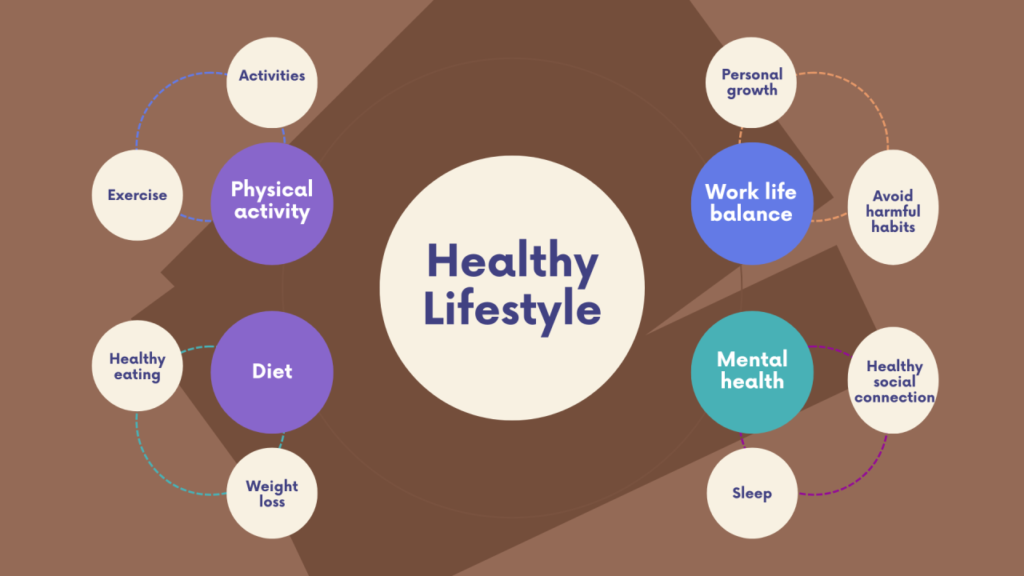Adopting a healthy lifestyle is fundamental for personal growth and development. Here’s expert advice on how to incorporate healthy habits into your daily routine to achieve overall well-being:
1. Nutrition
Balanced Diet: Eat various foods, including fruits, vegetables, whole grains, lean proteins, and healthy fats. Aim for a colorful plate to ensure you’re getting a range of nutrients.
Hydration: Drink plenty of water throughout the day. Aim for at least 8 cups (2 liters) daily, more if you’re active.
Limit Processed Foods: Reduce the intake of sugary, salty, and highly processed foods. Opt for fresh, whole foods whenever possible.
Portion Control: Be mindful of portion sizes to avoid overeating. Listen to your body’s hunger and fullness cues.
2. Physical Activity
Regular Exercise: Aim for at least 150 minutes of moderate aerobic activity or 75 minutes of vigorous activity per week, combined with muscle-strengthening exercises twice a week.
Find Enjoyable Activities: Choose exercises you enjoy, such as walking, cycling, dancing, or swimming, to make it easier to stick with your routine.
Incorporate Movement: Include physical activity in your daily routine, like taking the stairs instead of the elevator, walking or biking to work, and doing household chores.
3. Mental Health
Mindfulness and Meditation: Practice mindfulness techniques like meditation, deep breathing, yoga, or praying to reduce stress and increase mental clarity.
Positive Mindset: Cultivate a positive mindset by practicing gratitude, focusing on positive aspects of your life, and challenging negative thoughts.
Breaks and Relaxation: Take regular breaks throughout your day to rest and recharge. Engage in activities that relax you, such as reading, listening to music, or spending time in nature.
4. Sleep
Consistent Schedule: Go to bed and wake up at the same time every day, even on weekends, to regulate your internal clock.
Sleep Environment: Create a restful sleeping environment by keeping your bedroom cool, dark, and quiet. Invest in a comfortable mattress and pillows.
Limit Stimulants: Avoid caffeine and electronics before bedtime. Engage in a calming bedtime routine, such as reading or taking a warm bath.
5. Social Connections
Healthy Relationships: Foster positive relationships with family, friends, and colleagues. Surround yourself with supportive and encouraging people.
Community Involvement: Participate in community activities or volunteer work to build a sense of belonging and purpose.
Communication: Practice effective communication skills to strengthen your relationships and resolve conflicts constructively.
6. Personal Growth
Set Goals: Define clear, achievable goals for personal and professional development. Break them down into smaller steps and track your progress.
Continuous Learning: Engage in lifelong learning through reading, taking courses, or acquiring new skills. Stay curious and open to new experiences.
Self-Reflection: Regularly reflect on your experiences, challenges, and achievements. Use journaling or talking with a mentor to gain insights and foster self-improvement.
7. Work-Life Balance
Prioritize Tasks: Identify and prioritize your tasks to manage your time effectively. Use tools like to-do lists, calendars, and time management apps.
Set Boundaries: Establish clear boundaries between work and personal time to avoid burnout. Communicate your limits to others and stick to them.
Leisure Activities: Make time for hobbies and activities that bring you joy and relaxation. Pursue interests outside of work to maintain balance.
8. Avoid Harmful Habits
Substance Use: Avoid excessive alcohol consumption, smoking, and drug use. Seek support if you need help overcoming addictions.
Screen Time: Limit screen time, especially for non-work-related activities. Take regular breaks to reduce eye strain and improve mental well-being.
Final Thoughts.
Adopting a healthy lifestyle is a continuous journey that requires dedication and self-awareness. Start by making small, manageable changes and gradually build upon them. Remember that balance is key, and being kind to yourself is important during this process. By prioritizing your physical, mental, and emotional health, you’ll pave the way for personal growth and a fulfilling life.
